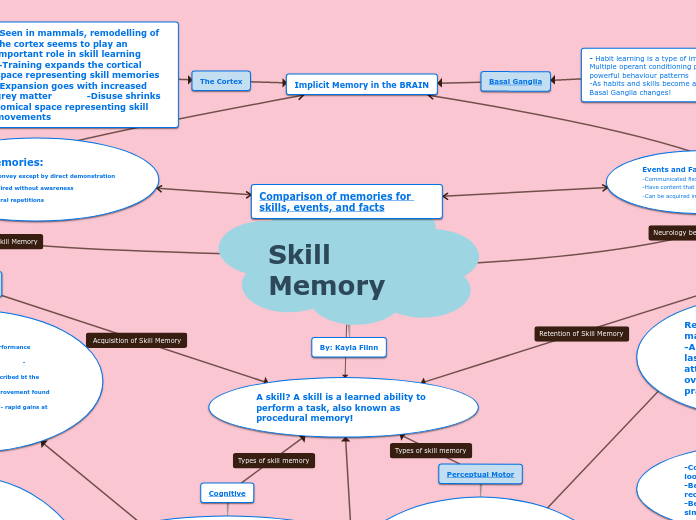Skill Memory
By: Kayla Flinn
Perceptual Motor
-Movements guided by sensory information
-Can be learned through operant conditioning -Visually, non-verbally/ unconsciously obtained
Cognitive
-Mental operations such as problem solving or reasoning -Could be expressed verbally but not always
Practice
-With effective practice, performance increases -Improvements in performance are described bt the Power Law of Practice (pattern on improvement found to be similar across species and tasks)- rapid gains at first, then gradual plateau
Making practice effective:
-Feedback: Influential for most types of learning
- Does feedback = more improvement? Yes, and no
- For simple perceptual motor skills. more feedback increases accuracy at the beginning but no improvement of long term memory retention
BUT
-Practice can be effective with or without conscious effort or feedback
-Perceptual learning does not require attention or feedback, although it can speed it up
Timing:
-Spreading out time (spaced) or crammed together (massed)
Expertise
Retention and Recall
Retention/ Recall influenced by many factors:
-Amount of time passed between last practice and retrieval attempt...-> decay... interference, over learning or amount of skill practice
-Complexity of the skill: Closed VS Open loop-> Perceptual VS cognitive
-Better Retention if tested for recognition VS Recall
-Better retention if retrieval conditions similar to encoding-> Transfer Specifity
Interference
Skills learning and recall can deteriorate due to interference from other skills
What Leads to Forgetting?
-Simple Passages of time with no further practice (like trace decay theory)
-Or things we do when time is passing (interference theory)
-Or is it due to how well we encode the initial skill memory (consolidation theory)
Sources of evidence include Trempe et al., 2011. Suggests that experiencing interference after learning takes place can affect retention, also the consolidation
